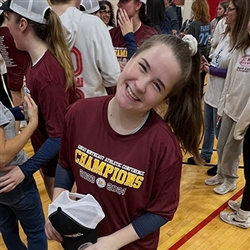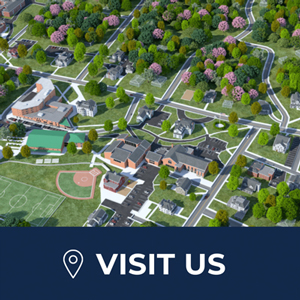
Early Childhood Education Licensure (pre-kindergarten to grade 2) at Lasell
The Early Childhood Education (PreK-Grade 2) major is designed for students who seek licensure in the Early Childhood licensure program (Pre-K-2nd grade). The program teaches you developmentally appropriate practices for teaching and learning in grades pre-kindergarten through 2.
Students complete practicum experiences all four years in suburban and urban school settings through our partner school district sites.
A fifth-year option allows you to graduate with a Master of Education.
Program Features
- Lasell’s two on-campus Holway Child Study Centers give you the chance to work with infants, toddlers, and preschoolers steps from your dorm – from the start of your first year.
- Gain additional teaching skills using innovative technologies like TeachLivE which simulates a real classroom and allows you to try out strategies and methodologies.
- Courses include literacy development in preschool and early elementary school districts.
- Complete pre and full practicums in urban and suburban school districts.
- Students are expected and supported to complete their MTELs so that they can be licensed and ready to teach once leaving Lasell.
Note: Lasell offers licensure and non-licensure degree programs in education that are designed to meet the licensure requirements in the state of Massachusetts. Licensure may be valid in other states but may require additional steps and cannot be guaranteed. To learn more about licensure requirements in other states, please visit the Licensure Disclosure page.
What You'll Learn
From your first day, you’ll take courses in your major, work with students, and advance towards graduation with a yearly plan. Not sure what classes to take? We’ll help you create the perfect plan.
View our
4 Year Plan for a year-by-year breakdown of potential courses you can take to complete your Early Childhood Education major in four years.
Sample Early Childhood Education Courses
| Course Code |
Course Title |
Credits |
| Early Childhd Ed |
| ED109 |
Invitation to Teaching |
1 |
| ED110 |
Teaching & Learning in American Schools |
4 |
| ED206 |
Early Literacy Teaching & Learning |
4 |
| ED208 |
Elem Literacy Teaching & Learning |
4 |
| ED219 |
Supporting Learner Variability |
4 |
| ED309 |
Sheltered English Immersion |
3 |
| ED327 |
Literacy Assessment & Instruction |
4 |
| ED335 |
Teaching Mathematics: PK - 2 |
4 |
| ED338 |
Inclusive Education |
4 |
| ED342 |
Teaching Science Concepts: PK - 2 |
4 |
| ED417 |
Pre-Practicum: PK - Grade 2 |
3 |
| ED420 |
Integrated Instruction: PK - Grade 2 |
3 |
| ED421 |
Curriculum Integration |
3 |
| ED494 |
Professional Standards & Ethics |
3 |
| ED496 |
Practicum: Early Childhood |
9 |
| ENG208 |
The Structure of the English Language |
3 |
| ENG209 |
Intro to Literature & Literary Studies |
3 |
| MATH107 |
College Geometry |
3 |
| MATH304 |
Mathematics for Educators |
3 |
| PSYC101 |
Psychological Perspectives (KP) |
3 |
| PSYC221 |
Child Development |
3 |
| SCI103 |
Science for Educators I (KP) |
3 |
| SCI104 |
Science for Educators II (KP) |
3 |
|
- Tomorrow's Teachers, a student-run and faculty-advised club on campus, provides peer mentorship, interclass collaboration and academic support through study groups and MTEL preparation.
- The Lasell College Chapter of Niños de Veracruz raises money to develop libraries, promote literacy, and provide scholarships for children in the state of Veracruz, Mexico.
With the Education program at Lasell, students have become versatile and collaborative professionals who flourish in classrooms at the early childhood, elementary, and secondary levels. Students are expected and supported to complete their MTELs so that they can be licensed and ready to teach once leaving Lasell.
Student teachers attend the site full-time (Monday - Friday) for the full semester. Working under the supervision of specific teachers, they take on increasing responsibility for planning, teaching, and evaluating lessons; interacting with children; and managing all aspects of the classroom. For two weeks near the end of the placement, student teachers take over the full day, including all planning, teaching, and management.
Freshman Tutoring
Freshman Requirements: Tutoring in Wednesdays at Williams (math) or other formal setting approved by ED 110 instructor. Licensure students begin teaching young learners in their first year at Lasell. These structured tutoring programs give them experience in meeting various needs and using appropriate materials.
Sophomore, Junior Pre-Practicum
Sophomore Requirements: A minimum of 25 hours per semester connected to literacy and math methods courses.
Junior Requirements: A minimum of 25 hours per semester connected to literacy, science, and social studies methods courses. Students work in specific classrooms with assignments specific to methods courses in which they are enrolled. Assignments begin with observing the classroom teacher and aspects of organizing for particular subjects, and include planning, teaching, and assessing using materials and objectives appropriate to the grade level and subject in urban and suburban schools.
Senior Pre-Practicum
Senior Requirements: A minimum of 150 hours in fall (pre-practicum) and a minimum of 300 hours in spring (practicum). Students attend the site two full days per week for the full semester. Working with one teacher, they take responsibility for various aspects of the curriculum. By the end of the semester, they have planned and taught lessons in all subjects in urban and suburban schools.
Sample practicum sites:
- Cabot Elementary School, Newton
- Douglas MacArthur Elementary School, Waltham
- Franklin Elementary School, West Newton
- Gardner Pilot Academy, Allston
- Hurley K-8 School, Boston
- Lincoln-Eliot Elementary School, Newton
- McDevit Middle School, Waltham
- Mission Hill K-8 School, Jamaica Plain
- Oakdale Elementary School, Dedham
- Pierce School, West Newton
- Saint Bridget School, Framingham
- Summer School, Lynnfield
- Ward Elementary School, Newton
- Whittemore Elementary, Waltham
- William H. Lincoln School, Brookline
- Williams Elementary School, Auburndale
 |
Lori Rosenthal, Ph.D.
Assistant Provost; Professor of Psychology
Areas of Expertise: psychological perspectives; personality psychology; social psychology
|
 |
Patricia Garcia, Ph.D.
Assistant Professor of Education
Area of Expertise: School improvement; teacher leadership and social change; bilingualism and second language acquisition
|
 |
Elizabeth Hartmann, Ph.D.
Graduate Chair and Professor of Education
Area of Expertise: Universal Design for Learning (UDL); inclusive education; cultural competence; supporting learner variability
|
 |
Amy Maynard, Ed.D.
Professor of Education
Area of Expertise: early literacy; elementary literacy and assessment; elementary literacy
|
 |
Claudia Rinaldi, Ph.D.
The Joan Weiler Arnow '49 Professor/Professor of Education, Chair of Education
Area of Expertise: response to intervention; issues related to english language learners; multiculturalism in education
|
.

Lasell University's education program has been recognized by Colleges of Distinction for its excellent programming.
Learning Outcomes
- Become am effective and engaging teacher who can write a lesson plan and lead a classroom
- Create learning environments to support:
- learners’ diverse needs (e.g., hearing or vision needs, learning styles, multiple intelligences)
- students from diverse cultural and linguistic backgrounds
- opportunities for all students to demonstrate academic ability
- Be understanding of own learning style and be able to to evaluate and modify your own teaching methods. plan and implement their own professional development based on their critical reflections.
For a complete list of courses and Learrning outcomes, view the Academic Catalog >>
Career Success with an Early Childhood Licensure Degree
Our students have practice taught at:
- Cabot Elementary School, Newton
- Douglas MacArthur Elementary School, Waltham
- Franklin Elementary School, West Newton
- Gardner Pilot Academy, Allston
- Hurley K-8 School, Boston
- Lincoln-Eliot Elementary School, Newton
- McDevit Middle School, Waltham
- Mission Hill K-8 School, Jamaica Plain
- Oakdale Elementary School, Dedham
- Pierce School, West Newton
- Saint Bridget School, Framingham
- Summer School, Lynnfield
- Ward Elementary School, Newton
- Whittemore Elementary, Waltham
- William H. Lincoln School, Brookline
- Williams Elementary School, Auburndale
Request more information about the Early Childhood Education major:
Loading...









 Accelerated Master's Program
Accelerated Master's Program


